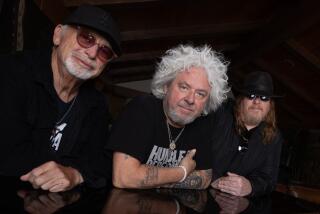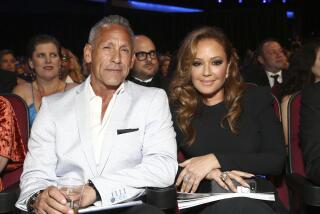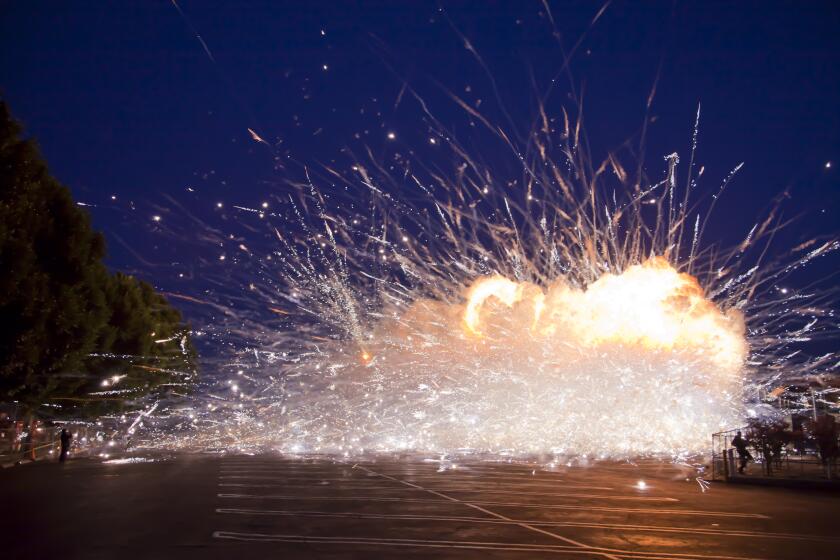Egyptian Satire Taps the Feelings of the Arab Street
This is how the world looks from a drafty playhouse in the downtown caverns of this capital: America is a simpering, conniving matron in silly hats. Israel is her cousin, lurking maliciously around the edges of the action. Arabs are a fractious and dysfunctional clan, sickly, spaced out and self-involved.
Then there’s the sorry spectacle of Egypt, a heavy-hearted man torn between his bickering brethren and the possibility of salvaging his family’s ancestral lands by marrying America.
“If I put my hand in her hand to live, my brothers and sisters will look down on me,” he says miserably. “But if I don’t, I’ll die of hunger.”
Egyptian playwright Mohammed Sobhi has wrought this anthropomorphic world in his newly revived satire, “Mama America.” The play is a sensation, packing in the weary workers of Cairo even now, when the economy is so rotten that many people couldn’t afford to buy meat for Ramadan feasts. Still, they fill the darkness, babies in their laps, and turn their faces upward to soak up the parody.
“For the first time, we feel somebody personifies our pain,” said Shaime Amin, a skinny, bright-eyed business student. “You see how America interferes with the Arab countries? We’re sitting here laughing, but deep down we’re crying, because this is happening to us.”
“Mama America” first opened here in 1991, running for five years and touring the Arab world before closing. But in the fall, as time seemed to have doubled on itself with another Palestinian intifada, another U.S. invasion of Iraq and anti-Americanism coursing through the region once again, Sobhi brought his play back to Cairo.
This time, the finale, in which U.S. policemen round up baffled Arab tourists after a massive terror attack in New York, no longer seems a flight of fancy. “In 1991, blowing up the Statue of Liberty was a symbolic gesture,” Sobhi said. “But I could see it then -- after the destruction of communism, the next threat would be Islam.”
A celebrated comedian, Sobhi charmed youngsters with a wildly popular television series and earned a reputation as an artist in the vanguard by building an art and agriculture compound -- Sombol’s City for Art and Flowers -- in the desert between Cairo and Alexandria.
He also drew international headlines and the ire of Israel and the United States with a soap opera he produced last year, “Horseman Without a Horse.” The show alluded to the “Protocols of the Elders of Zion,” a notorious anti-Semitic tract. Egyptians criticized the program, too, but for different reasons. Many complained that it made for dull television.
At the outset of “Mama America,” the Arab children are orphaned by their father’s death, and the plot centers on the infighting siblings’ attempt to gain control of their mortgaged land -- and salvage their dignity. Their father leaves them nothing but debt and an old car.
“It’s the engine that’s bad,” one deadpans to rowdy applause. “It’s an American engine, and American engines just suck the oil out.”
A stout, fussy dame in shiny hose and flowered hats, Mama America swoops down on the grieving family with soothing words and a fat bankroll. She outfits the kids in sunglasses, blue jeans and shoes that light up when they walk, plies them with apples and Pepsi.
But America is up to no good -- she is in cahoots with Israel. The pair have come to solidify their claim to the Arab family’s land by marrying its strongest son -- Egypt -- and erasing his memory. “They want to take our land,” Israel says ruefully. “My father worked so hard to steal that land.”
The play is a shudder from a nation often tugged between the demands of its $2-billion-a-year benefactor, the United States, and passions in the street. The U.S. invasion of Iraq sparked the most violent protests this police state has witnessed since the 1970s. Meanwhile, Egypt has been forced into the role of mediator between Israel and the Palestinians, even though Egyptian popular sympathies rest firmly with fellow Arabs.
Sobhi’s Egypt marries Mama America, believing he can get the better of her. Instead, he is cooped up in her mansion and drugged into a stupor. Bit by bit, he forgets who he is.
Sobhi’s script exclaims to America, “Your crimes are too obvious now, and we won’t be quiet. To hell with the day I didn’t listen to my father and followed you.”
But after the show, Sobhi showed off his life-size portraits of Charlie Chaplin and Marilyn Monroe that adorned his dressing room. “Look at my things -- I’m in love with America,” he said. “The problem is us. We’ve allowed the American administration to abuse us.”
Indeed, the play saves its sharpest lashes for Arabs, embodied by the siblings. Arab intellectuals are depicted by a doltish, would-be author who wanders the set with hashish pipe in hand, a bedraggled Cassandra who overhears the plots against his clan but is too stoned to remember to warn them.
Sobhi’s Persian Gulf states are a preening, pious and distracted lawyer, the only one of the siblings to make any money -- and the least willing to share it. Iraq is a bully, absent-minded but omnipresent, lifting barbells while his brothers fret.
“The days of our miracles are over,” says a mournful brother. “We’re the ones functioning upside-down, and we need to fix it,” says another.
In the audience, business student Amin perched on the edge of her seat. She whispered the lines along with the actors and clutched a dog-eared diary to her chest. She had scrawled dozens of pages inspired by the play, she said.
Amin and her siblings saved up cash for cheap seats, then made their way downtown on a chilly night. When they arrived, though, her brother and sister decided to chip in their ticket money so Amin could sit in front. They waited outside while she sat enraptured.
“We are ridiculous to the Americans,” she said during intermission. “That’s how we feel.”
More to Read
The biggest entertainment stories
Get our big stories about Hollywood, film, television, music, arts, culture and more right in your inbox as soon as they publish.
You may occasionally receive promotional content from the Los Angeles Times.






